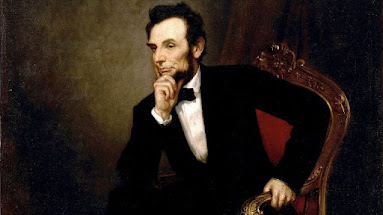 |
| Portrait of Abraham Lincoln 1887 Painting by George Peter Alexander Healy (hangs in the National Portrait Gallery, Washington, D.C.) |
Great leaders see the world through a lens larger than themselves. Faced with a nation tearing itself apart and dissent within his own ranks, Abraham Lincoln never let ego cloud his focus on the bigger picture. His choices regarding his Cabinet and patronage jobs reflected a shrewd, calculated approach to leadership that prioritized the greater good over personal grievances.
Civil War historian Shelby Foote described Lincoln as "a very mysterious man," noting his ability to step outside himself and view situations with striking detachment. Almost everything Lincoln did, Foote observed, was "calculated for effect," a testament to his extraordinary intelligence and ability to craft decisions with precision and purpose. [1]
Lincoln’s sharp wit, pragmatism, and grounded perspective often shone through in the stories he told—tales that carried lessons in leadership. Two such stories, one about skunks and chickens and the other about a golden calf, reveal his remarkable patience and magnanimity in the face of political challenges.
Skunks and Statesmanship: Lincoln’s Patience in the Face of Political Pests
Leadership isn’t always glamorous—it often means dealing with life’s unavoidable annoyances, both figurative and literal. During the Civil War’s second year, Lincoln faced constant criticism and divisive dynamics within his Cabinet. Yet, instead of succumbing to pettiness or rash decisions, he chose patience and pragmatism.
This philosophy is perfectly illustrated in Lincoln’s humorous tale about Joe Wilson and his poultry shed. When urged to use the resignation of his Secretary of War as an opportunity to reorganize his Cabinet and remove dissenters, Lincoln responded with a story:
"Gentlemen, when I was a young man, I knew Joe Wilson, who built himself a log cabin not far from where I lived. Joe was very fond of eggs and chickens and took great pains to fit up a poultry-shed. Having gathered a choice lot of young fowls, he was soon annoyed by certain little black animals with white stripes [skunks]. One night, awakened by cackling and fluttering, Joe crept out to see what was going on. In the bright moonlight, he caught sight of half a dozen of the little pests, running in and out of the shadows of the shed."
The story, with its unspoken conclusion, reminded his audience of the cost of rash decisions. Sometimes, the best course of action is to endure the nuisances rather than risk greater harm.
The Golden Calf and the Third Auditor: A Tale of Lincoln’s Magnanimity
Few leaders can forgive their fiercest critics, let alone reward them. Yet Lincoln stood apart, embracing magnanimity as a cornerstone of his presidency. When faced with the controversial appointment of John Wilson [no relation to "Joe" in the previous story]—a former political opponent—to the position of Third Auditor of the Treasury, Lincoln’s response showcased his ability to prioritize competence over personal animosity.
Ferdinand Iglehart, author of The Speaking Oak (1902), recounted this story through Noah Brooks, a close friend of Lincoln. Brooks had protested Wilson’s appointment, citing his hostility toward the President. Lincoln, however, calmly asked: "Is not Mr. Wilson an honest man? Is he not competent? Would he make a good Third Auditor of the Treasury?" When Brooks reluctantly agreed, Lincoln concluded: "Then I think that settles it. I do not allow any personal ill-treatment to affect my official administration." [3]
Lincoln then likened the situation to the biblical story of Moses and Aaron:
When Moses was on the Mount receiving the law of God, Aaron made a golden calf and caused a bolt in the camp. When Moses came down, he was very angry, but Aaron got his commission all the same. [3]
This decision, much like his biblical reference, underscores Lincoln’s extraordinary ability to rise above personal grievances and focus on the big picture—a leadership philosophy that stands in stark contrast to the pettiness often seen from today's leader. As iglehart concluded:
"How few in life will forget an injury, or fail to punish an enemy, if the opportunity shall offer." [3]
Lincoln’s decision to appoint John Wilson - much like his biblical reference to Moses and Aaron - showcases his extraordinary ability to look beyond personal history and focus on the bigger picture. It’s a leadership philosophy that stands in stark contrast to what we too often see today.
Conclusion
Abraham Lincoln’s presidency exemplifies what it means to lead with vision and magnanimity. From the Joe Wilson anecdote—where he humorously depicted the importance of restraint—to his decision to appoint John Wilson despite past opposition, Lincoln consistently prioritized the greater good over personal grievances. His ability to recognize talent and foster unity, even among critics and rivals, speaks to his extraordinary character. In a world too often dominated by pettiness today, Lincoln reminds us that true leadership rises above. His enduring example challenges us to see the bigger picture and seek grace in our own lives, even amid adversity.
These are more stories from the archives of Abe Lincoln, Storyteller.
Mac
📚 Works Cited
[1] Foote, Shelby (2005). The Civil War: A Narrative - 3 Volumes. New York City, NY: Random House Publishing.
[2] Goodwin, Doris Kearns (2006) Team of Rivals: The Political Genius of Abraham Lincoln. New York City,NY: Simon & Schuster.
[3] Iglehart, Ferdinand C. (1902). The Speaking Oak and 300 Other Tales of Life, Love and Achievement. New York City, NY: The Christian Herald. p.240.
No comments:
Post a Comment